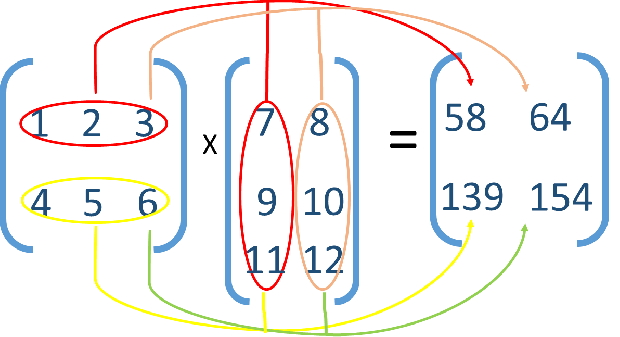Matrix multiplication in Python

Matrix Multiplication without using any built-in functions
rows=2
cols=3
M1=[[1,2,3],
[4,5,6]]
M2=[[7,8],
[9,10],
[11,12]]
my_list=[]
for l_row in range(0,rows):
temp_list=[]
for k in range(0,rows):
sum1=0
for l_col in range(0,cols):
sum1=sum1+(M1[l_row][l_col]*M2[l_col][k])
temp_list.append(sum1)
my_list.append(temp_list)
for row in my_list:
print(row)[58, 64]
[139, 154]from random import randrange
rows=4
cols=4
M1=[]
M2=[]
for j in range(0,rows):
temp1=[]
for k in range(0,cols):
x=randrange(10)
temp1.append(x)
#print(x)
M1.append(temp1)
print(M1)
print("M1 shown above ")
for j in range(0,cols):
temp1=[]
for k in range(0,rows):
x=randrange(10)
temp1.append(x)
M2.append(temp1)
print(M2)
print('M2 is shown above ')
my_list=[]
for l_row in range(0,rows):
temp_list=[]
sum1=0
for k in range(0,rows):
sum1=0
for l_col in range(0,cols):
sum1=sum1+(M1[l_row][l_col]*M2[l_col][k])
temp_list.append(sum1)
my_list.append(temp_list)
for row in my_list:
print(row)[[3, 3, 8, 3], [0, 3, 8, 0], [3, 5, 4, 7], [7, 5, 6, 9]]
M1 shown above
[[4, 5, 1, 2], [5, 6, 3, 6], [9, 7, 3, 2], [8, 4, 1, 6]]
M2 is shown above
[123, 101, 39, 58]
[87, 74, 33, 34]
[129, 101, 37, 86]
[179, 143, 49, 110]print("Using Numpy and checking result")
import numpy as np
res = np.dot(M1,M2)
print(res)List

Subhendu Mohapatra
Author
🎥 Join me live on YouTubePassionate about coding and teaching, I publish practical tutorials on PHP, Python, JavaScript, SQL, and web development. My goal is to make learning simple, engaging, and project‑oriented with real examples and source code.
Subscribe to our YouTube Channel here
This article is written by plus2net.com team.
https://www.plus2net.com

 Python Video Tutorials
Python Video Tutorials